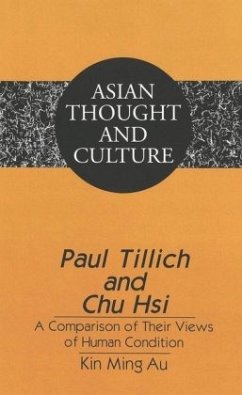This book demonstrates the similarities within differences between Paul Tillich's (1886-1965) and Chu Hsi's (1130-1200) concepts of human condition. Tillich and Chu, one of the leading Christian theologians of the twentieth century and the greatest Sung Neo-Confucian philosopher respectively, were both profound students of human nature. By developing three vague comparative theological categories - unity, activity, and reunification - this book suggests that, although these two great thinkers came from two radically different religious traditions and cultures, Tillich and Chu articulated similar views of the unity of human reality and the problem of human existence. Furthermore, they proposed remarkably parallel strategies to resolve the tensions of finite human existence in searching for a reunification of human nature with its root in divine reality. Although these three comparative categories are generated from the fertile matrix of Tillich's thought they are designed to deal with a problem and its resolution common to Chu's thought as well.
"This is an exciting study in comparative theology and philosophy based on two major thinkers, Paul Tillich and Chu Hsi. Although Tillich and Chu lived in vastly different cultures, they articulate a strikingly similar view of human reality and its predicaments. This book makes use of a sophisticated hermeneutic based on three main analytic categories: unity, activity, and reunification. This work shows how Tillich and Chu diagnosed and then tried to heal the existential dilemmas that arise from finitude, ignorance, and error in the mundane world. Moreover, Kin Ming Au illuminates the religious dimension of Chu's thought and demonstrates how Chu becomes an effective dialogue partner for Christian theology. This book ably promotes the growing international and intercultural dialogue between and among Christians and Confucians in the modern world." (John H. Berthrong, School of Theology, Boston University)
"Kin Ming Au has written a pioneering study of the human predicament based on a sophisticated comparison of Paul Tillich and Chu Hsi. The sophistication in the method of comparison allows not only for two thinkers from very different cultures to be thought together, but also allows for an analysis of the human predicament more subtle than would be possible from either thinker alone. Au joins the ranks of careful comparativists who have moved beyond intellectual history to critical, normative philosophy and theology, faithful to the texts of the traditions they study but innovative and responsible to the normative issues." (Robert C. Neville, Dean, School of Theology, Boston University)
"Kin Ming Au has written a pioneering study of the human predicament based on a sophisticated comparison of Paul Tillich and Chu Hsi. The sophistication in the method of comparison allows not only for two thinkers from very different cultures to be thought together, but also allows for an analysis of the human predicament more subtle than would be possible from either thinker alone. Au joins the ranks of careful comparativists who have moved beyond intellectual history to critical, normative philosophy and theology, faithful to the texts of the traditions they study but innovative and responsible to the normative issues." (Robert C. Neville, Dean, School of Theology, Boston University)

